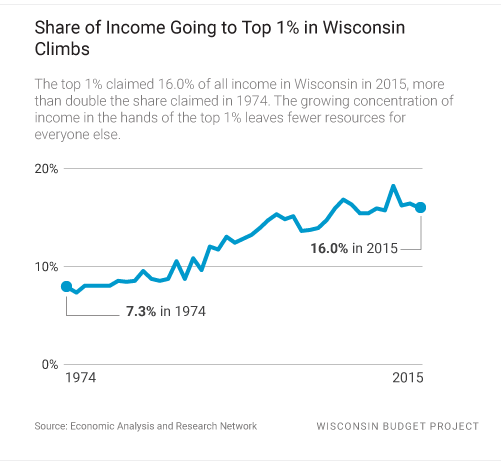Growing Wealth Gap Hurts Wage Earners
Kimberly-Clark subsidy helps wealthy stockholders with no gain for workers.
Our economy, our communities, our schools, and our families fare better when every person in the state has full access to opportunity.
But the gains from Wisconsin’s growth are not being widely shared. A growing concentration of income is being held in the hands of the top 1 percent, while the incomes of everyone else stagnate, making it harder to make ends meet and achieve economic security. There is an even greater gap between the almost exclusively white 1 percent in Wisconsin and communities of color where incomes are appallingly lower than their white counterparts.
The incomes of the very richest have skyrocketed in recent decades. Since 1973, the incomes of the top 1 percent nearly tripled even after taking inflation into account: the average income of the top 1 percent of Wisconsin residents is now $964,000. Meanwhile, the average incomes of everyone else increased a paltry 18 percent over that same period.
What’s happening is the rich are taking a continually-growing share of all income, leaving a smaller piece of the pie for everyone else. The share of all state income going into the pockets of the top 1 percent has more than doubled since the 1970s, to the point where they now take 16 percent of all income in Wisconsin, or $1 out of every $6 earned.
This trend is exacerbated by lawmakers who pass policies that are touted as a way boost the amount of economic activity in the state, but may do little to increase the pay of workers with low wages, and instead will funnel more money to the wealthy and well-connected.
One example is the recent handout to the Kimberly-Clark manufacturing plant in the Fox Valley. After Kimberly-Clark announced plans to close the profitable plant, Governor Scott Walker gave Kimberly-Clark a five-year subsidy worth up to $28 million. That subsidy won’t do much to boost the incomes of workers, from whom Kimberly-Clark demanded salary concessions averaging $8,000 per worker as a condition of keeping the factory open. Instead, the subsidy represents the use of public resources to primarily benefit the wealthy Kimberly-Clark shareholders. This subsidy comes on top of a state tax credit that wipes out the income tax liability of Kimberly-Clark and other manufacturers, another policy that confers huge benefits to a very small number of people and businesses.
The widening income gap, and the policies that contribute to the gap, disproportionately impact, block opportunity, and further restrict economic advancement for people of color in Wisconsin. A legacy of racial discrimination and public disinvestment in communities of color mean that people of color are often barred from joining the group of highest earners, and are left with a continually shrinking piece of the pie.
There’s no magic bullet that will completely undo the growth in inequality in Wisconsin, any more than there was a single cause. Many of the underlying trends causing the changes in our economic landscape are national and are related to broader changes in education, technology, and trade. Nevertheless, there are a number of steps we can take at the state level to keep income inequality from growing, including raising the minimum wage, strengthening tax credits for working families, combatting wage theft, and requiring paid family and sick leave. We also need to create a tax system that provides a level playing field for Wisconsin families and businesses, instead of one that further advantages the wealthy and well-connected who rig the tax code for their own benefit.
Wisconsin families and businesses can’t thrive when all the income growth goes to the very top. For Wisconsin’s economy to be on a solid foundation, everyone needs to benefit from increases in productivity. We must take action at the state level to counteract the growing concentration of income in a few hands and expand opportunity for everyone.
More about the Kimberly-Clark Plant Closings
- Op Ed: Growing Wealth Gap Hurts Wage Earners - Tamarine Cornelius - Jan 20th, 2019
- This Isn’t an Economic Development Strategy, This is an Extortion. - State Sen. Chris Larson - Dec 14th, 2018
- Kimberly-Clark to Keep Cold Spring Facility Open in Wisconsin - Gov. Scott Walker - Dec 13th, 2018
- Governor-elect Tony Evers Statement on Kimberly-Clark Announcement - Gov. Tony Evers - Dec 13th, 2018
- Kimberly-Clark Subsidy Stalled in Senate - Laurel White - Nov 28th, 2018
- Kimberly-Clark, Unions, Push for Subsidy - Laurel White - Nov 15th, 2018
- AFP-Wisconsin to Legislators: Reject Corporate Welfare - AFP Wisconsin - Nov 14th, 2018
- MacIver Institute Reminds Wisconsin Why Kimberly-Clark Bailout Is a Bad Idea - MacIver Institute - Nov 14th, 2018
- GOP Pushes Tax Giveaway Plan That Pays More for Fewer Jobs - One Wisconsin Now - Nov 14th, 2018
- Republican Opposition to Kimberly-Clark Bill Intensifies - Democratic Party of Wisconsin - Oct 4th, 2018
Read more about Kimberly-Clark Plant Closings here
Op-Ed
-
Unlocking Milwaukee’s Potential Through Smart Zoning Reform
 Jul 5th, 2024 by Ariam Kesete
Jul 5th, 2024 by Ariam Kesete
-
We Energies’ Natural Gas Plans Are A Mistake
 Jun 28th, 2024 by John Imes
Jun 28th, 2024 by John Imes
-
Milwaukee Needs New Kind of School Board
 Jun 26th, 2024 by Jordan Morales
Jun 26th, 2024 by Jordan Morales
























While I agree with the premise of this op ed, I take exception to a number of its premises. In particular, the notion that the economy is a pie to be divided up. This type of thinking harkens back to Maltus who postulated that there was a fixed amount of wealth available to all. If some took a larger share, then there was less available for everyone else. In fact, wealth grows and shrinks exponentially. The more who are involved in creating wealth and the more resources each has by which to create wealth, the more wealth there is for everyone.
Government policies such as those passed by Walker and the Republican legislature these last 8 years, have concentrated wealth and resources in fewer and fewer hands. Their policies have left many unable to participate fully in the economy particularly communities of color and our rural populations. The end result is Wisconsin lags behind our neighboring states and the nation as a whole.
There is an old adage, the poor spend, the middle class save and the wealthy accumulate. What grows economies are spending, which increase the need for goods and services providing the fuel to grow production and jobs; and saving which provides the investment needed to expand economic capacity. The activity of the wealthy–accumulate–does little to foster prosperity. History shows that the concentration of wealth causes boom/bust economic cycles that eventually lead to economic collapse.